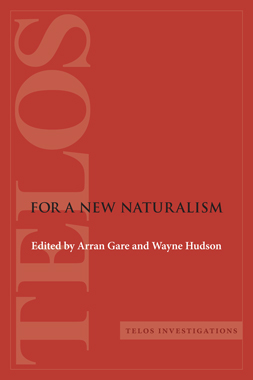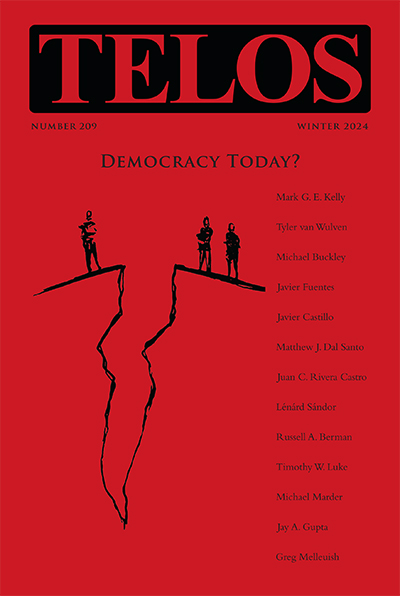Telos Investigations is a new book series that collects papers delivered at Telos-Paul Piccone Institute conferences. The first volume in the series, For a New Naturalism, edited by Arran Gare and Wayne Hudson, is now available for purchase in our online store. Save 20% on the list price by using the coupon code BOOKS20 during the checkout process.
 Western civilization has been afflicted by a divide between the sciences and the humanities, a divide that has been harmful to both. The first volume in our new Telos Investigations series, For A New Naturalism elaborates the implications of recent developments in natural philosophy that challenge both Cartesian dualism and reductionism. The contributors to this volume write from a variety of political, philosophical, and scientific standpoints. They all agree, however, that a civilization based on reductionist naturalism, with its impoverished understanding of both human life and the universe, is failing to generate the political and social thought we need. And they all support the need for a wider naturalism than the objectivating naturalism that emerged in seventeenth-century Europe. In addressing the contested status of naturalism in contemporary philosophy, the contributions to this volume question both prevailing assumptions about nature and assumptions about what is knowledge. They argue for a new alliance between science and the humanities, and spell out some of the implications of this challenge for philosophy, society, and religion.
Western civilization has been afflicted by a divide between the sciences and the humanities, a divide that has been harmful to both. The first volume in our new Telos Investigations series, For A New Naturalism elaborates the implications of recent developments in natural philosophy that challenge both Cartesian dualism and reductionism. The contributors to this volume write from a variety of political, philosophical, and scientific standpoints. They all agree, however, that a civilization based on reductionist naturalism, with its impoverished understanding of both human life and the universe, is failing to generate the political and social thought we need. And they all support the need for a wider naturalism than the objectivating naturalism that emerged in seventeenth-century Europe. In addressing the contested status of naturalism in contemporary philosophy, the contributions to this volume question both prevailing assumptions about nature and assumptions about what is knowledge. They argue for a new alliance between science and the humanities, and spell out some of the implications of this challenge for philosophy, society, and religion.
Praise for For a New Naturalism
“Philosophy—and human society—have been crashed by a scientific naturalism that dismisses subjectivity and values on the one side, and a world-denying supernaturalism on the other. In between lies the richness of natural existence in all its fullness: values and intentions, culture and communities, imagination and speculation. For a New Naturalism calls readers back to a genuinely ecological mode of being on this planet.”
—Philip Clayton, Ingraham Professor of Theology, Claremont School of Theology, and author of Organic Marxism: An Alternative to Capitalism and Ecological Catastrophe
“Naturalism is finally receiving the attention it deserves in critical and social theory. We need to be much clearer about what we mean by ‘nature’ and about the form of naturalism we can rationally endorse. Contributions to this debate are to be warmly welcomed in the twenty-first century.”
—Rom Harré, Emeritus Fellow of Linacre College, University of Oxford
“Rethinking naturalism is a crucial challenge facing twenty-first-century science and philosophy.”
—Terrence W. Deacon, Professor of Biological Anthropology, University of California, Berkeley, and author of Incomplete Nature: How Mind Emerged from Matter



